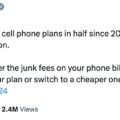In the weeks leading up to the CRTC hearing on wireless services, there was no shortage of corporate lobbying, opinion pieces from telecom company consultants downplaying concerns about the competitiveness of the Canadian wireless market, and comments from company executives threatening to reduce investment if the CRTC mandated new competitions through MVNOs. Those claims have continued this week throughout the hearing.
Independent studies from around the globe have for years (here, here, here, here, here) found that Canadians face some of the highest wireless prices in the developed world. Yet if the usual claims of a fiercely competitive, reasonably priced wireless market provides a sense of deja vu, consider:
In 2000, the Canadian Wireless Telecommunications Commission responded to concerns about marketplace competition by assuring “the Canadian wireless market has been competitive from the outset.”
In 2004, Rogers Wireless Communications argued competition concerns with its proposed merger with Microcell, which reduced the number of major wireless competitors from four to three were unwarranted. The merger would leave Canada with only one GSM provider, but the company claimed it would not substantially lessen or prevent competition.
In 2006, the wireless carriers argued there was no need for concern when the then-new Conservative government acquiesced to telecom lobbying by introducing a new policy direction for the CRTC to rely on market forces to the maximum extent feasible, thereby avoiding new regulatory measures.
In 2007, as the government began considering a spectrum set-aside to allow for new entrants into the marketplace, Telus maintained that there is no need for a set-aside in “vigorously competitive” market, while Rogers characterized the new entrants as “all-time corporate welfare bums.”
In 2008, the wireless providers argued there was no need for the policy measures as the government considered rules such as tower sharing and domestic roaming agreements alongside the new entrant spectrum set-aside. After the government introduced the measures, Bell spent years in court challenging the policies.
In 2010, Bell argued against relaxing foreign investment restrictions in the telecommunications market. The company claimed that there was no problem accessing foreign capital and no need for reforms based on “ill-defined problems.”
In 2010, the Competition Bureau brought an action against Rogers over its wireless advertising which led to a federal court ruling that ordered the company to pay $500,000 in penalties over the failure to perform adequate testing to substantiate its claims.
In 2011, the CWTA argued against provincial enforceable consumer protection codes for wireless services. A non-binding code of conduct was sufficient, it argued.
In 2011, Rogers ramped up lobbying on wireless spectrum, urging customers to write to the government to warn that a set-aside would “adversely impact Canadian consumers.”
In 2011, Bell paid a $10 million penalty to the Competition Bureau for misleading advertising regarding its bundled services including wireless and Internet services.
In 2013, Bell, Telus and Rogers went on “immediate war footing” to conduct an extensive lobbying campaign to stop the entry of Verizon into the Canadian market.
In 2013, Rogers argued the cost of building a data use notification system would make it “economically unfeasible.” Telus argued that consumer notifications for voice and text usage would be difficult to build.
In 2013, Bell announced plans to establish a targeted advertising program that would aggregate data usage across its services. In 2015, the Privacy Commissioner of Canada found Bell’s plan violated Canadian privacy law. The company initially rejected the findings.
In 2014, the CRTC concluded that Rogers had for years included unfair clauses in their domestic roaming agreements.
In 2015, Bell was fined $1.25 million by the Competition Bureau for encouraging employees to post fake app reviews and ratings to its mobile app stores.
In 2015 and 2016, Bell, Telus, and Rogers all settled complaints with the Competition Bureau over charges for unwanted premium text messages, with companies refunding tens of millions of dollars to consumers.
In 2017, Bell, Rogers, and Telus all opposed efforts to ban cellphone unlocking fees, warning that all customers would pay the costs rather than just those seeking an unlocked phone. The CRTC mandated free unlocking after data surfaced that the companies were collecting tens of millions in unlocking fees.
In 2017, Bell, Rogers, and Telus all opposed efforts to bring more competition to the market with MVNOs. Instead of more competition, Rogers recommended creating a voucher program for low income Canadians to address the affordability of wireless services.
In 2018, the government ordered the CRTC to investigate reports of high pressure sales tactics by Bell, Telus, and Rogers. The CRTC concluded customers faced unacceptable harm in its 2019 report.
For the past year, the Big 3 have recycled many of the same messages in the current wireless review to oppose new measures aimed at fostering greater competition. The simple reality is that after two decades of debates, Canadian wireless prices are still among the highest in the OECD. Bell CEO Mirko Bibic is right when he says the current hearing is the most important in years. The time for the government and CRTC to take action in support of competition and Canadian consumers is long past overdue.









Im in the low income ,I cannot aford a cell phone.
The price of cell phone has to come down for poeple with low income
Cell phone plans are already low compared to the infrastructure required to cover 96% of Canadians in one of the largest countries with one of the lowest population densities in the world. The providers don’t control the price of the phones, that is done by Apple, Samsung, Huawei, etc. Every provider has a “Bring You Own Device” plan. The plans start around $25/month. When you want to add a $1000 iPhone and don’t want to pay up front, you are paying an extra $40/month on a 2 year plan for $65/month. The phone cost more than the network.
If you want any amount of useable date plans are not affordable!
Pingback: News of the Week; February 26, 2020 – Communications Law at Allard Hall